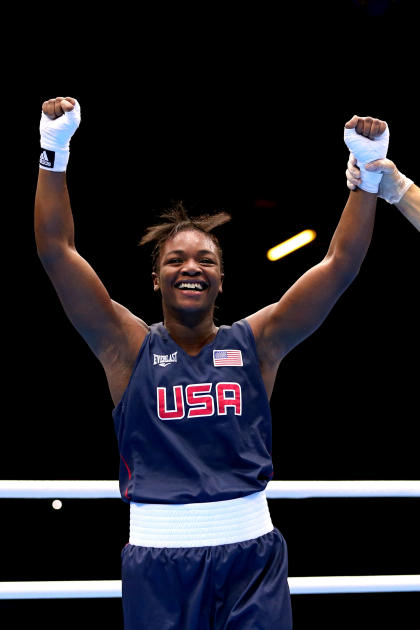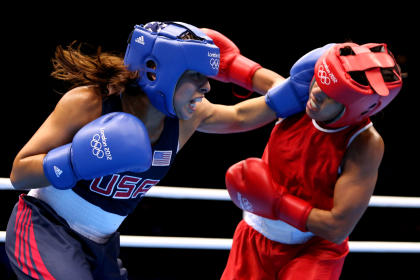Claressa Shields and Marlen Esparza give U.S. Olympic boxing program a fighting chance

LONDON – She fights for the father who left prison and for the brother who sits there now, writing letters to her every day, telling her to be strong. She fights for her broken city back home and for the men who have died. And as she hits, she prays that the killing will stop, even when it never does.
Mostly, Claressa Shields of Flint, Mich., boxes because it's all she's got, because sometimes beating another woman in a ring is better than the alternative, and because she doesn't want to know what would happen if she didn't do this.
"It's definitely kept me alive," she said.
This is the new face of American amateur boxing – young, feminine, and fearless. On Monday, Shields won her middleweight quarterfinal fight against Sweden's Anna Laurell, assuring herself of at least a bronze medal. Just two hours before, her teammate Marlen Esparza, a flyweight and model for Cover Girl makeup, won her quarterfinal match, meaning she, too, will leave here with a medal.
From the ruins of the men's boxing team, an Olympic disaster, come the women, who have been allowed to fight in the Games for the first time. While the men collapsed again this year, needing a protest just to keep a lone medal hope alive, two women with distinctly different styles and personalities pounded their way to a medal stand.
After her fight, Esparza bounced through the tunnel beneath the ExCel Center stands and giggled that her hair stands on the back of her head. She glanced at her nails, some of which were painted red, white, and blue, and she laughed. She said she's going to school after the Olympics are over and will probably never box again.
"I'm actually really negative," she said describing her personality. "I think I spit out a lot of negativity before I fight because it allows me to keep positive inside. That way, no matter what people think, I'm happy on the inside."
She laughed.
"That's weird," she added.
[ Related: Queen Underwood makes Olympic boxing history ]
After her fight, Shields talked about her father, Bo, a one-time boxer who was in prison until she was 9, and how he inspired her to fight with a talk about Laila Ali. She talked about her older brother Artis, who is in prison and never used to let her cry. And she talked about the people who died. There was 'Twan, the guy from the gym, and those other friends she knew from around town. Gone to gunshots. All of them dead. And how about Anthony? He gave up on boxing, but he'd always joke that they should fight. He was shot the other night while Shields was here in London, killed in the parking lot of a doughnut shop. He was 18.
"Yeah, I think boxing may have helped me out," said Shields, just 17 and a high school junior herself. "It definitely helped me control my anger … and stay calm."
Someone asked her what she does when she thinks about the violence swirling in her life.
"I pray to God," she said. "I have prayed that I didn't lose any of my friends."
Then she gave a small shrug.
"But stuff happens," she said.

Somewhere, the U.S. men have lost the focus the women have. Much of the blame might come from an intense amateur system, in which boys are trained to be pros by their fathers and local coaches and never fit well into the Olympic program. But there is something else, something bigger, something that couldn't properly be measured until they were working together in the same room. The coaches won't say it, but they allude to it when talking privately.
The women listen. The men do not.
"The women bring a different energy, too," said U.S. assistant coach Anthony Chase, who was in Shields's corner. "They bring that energy and intensity to the table, and that makes it more exciting to see them."
Then he added this.
"It seems like the girls are trying to pull us back to the top," he said. "Which is a good thing. Somebody's got to do it."
Esparza did her best. She watched a lot of the men's fights last week and believed the judges wanted to see the boxers fight with a more professional or wide-open style, instead of just shooting to score points with jabs to certain parts of the torso. She ran into her early afternoon fight and easily knocked the top seed, China's Cancan Ren, around the ring. Her victory was never in doubt.
Esparza has become a celebrity through her Cover Girl advertisements. Those looking for a face to represent women's boxing quickly settled on her, and she seems comfortable with the attention. She laughed at that. On Sunday, she was hitting with an assistant coach in the Olympic Village when suddenly someone from behind asked if he could take a picture. She whipped around to find herself staring at Kobe Bryant, LeBron James, and Carmelo Anthony.
[ Related: Errol Spence gets second life after appeal, but USA Boxing still in shambles ]
"Ohhhhhh," she told them. "I would have tried [punching] harder if I knew it was you."
She called them "famous people."
When it suggested that maybe she was famous to the famous people, she quickly shook her head.
"I'm popular, not famous," she said. "Big difference. I don't get harassed at the McDonald's line."
With a medal, that will change. The men might have done little in these Games, but the women have brought life to an Olympic sport that seemed to be taking its final breaths. Suddenly, the faceless team has two new faces, the way it used to have so many for the men.
Soon someone will dangle medals around their necks. They will hold bouquets and wave.
From the embers of American men's boxing will come the women.
And maybe Olympic boxing will matter once again.
Related Olympics coverage on Yahoo! Sports:
More Olympics coverage on Yahoo! Sports:
• Photos: 20 inspirational moments in Olympic history
• Why did Serena Williams dance on the medal stand?
• The legacy of Michael Phelps
